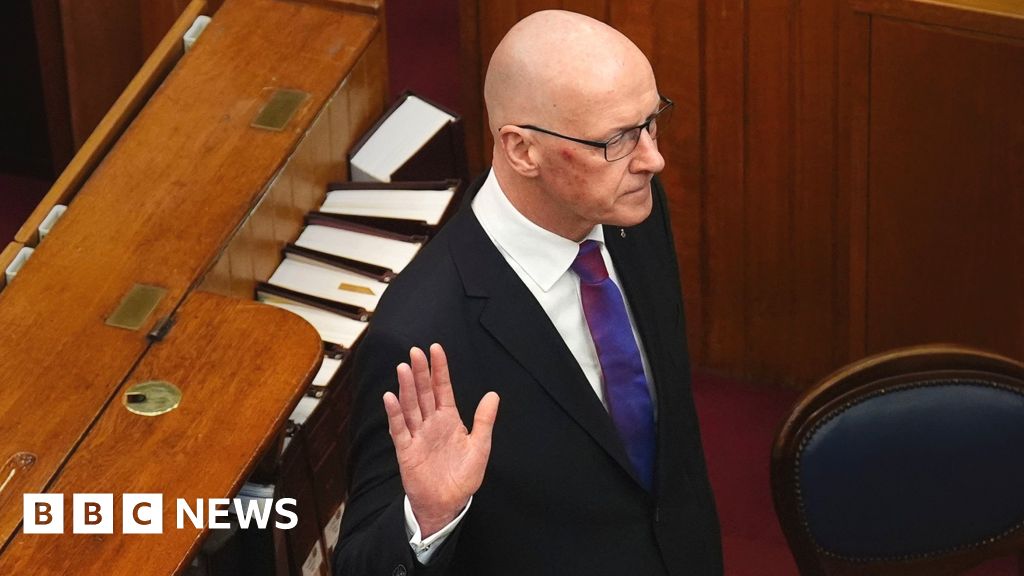Bussiness
John Swinney sworn in as Scotland’s first minister – BBC News

- By James Cook & Mary McCool
- BBC News
SNP leader John Swinney has been sworn in as the seventh first minister of Scotland.
He was confirmed in the role during a brief, formal ceremony at the Court of Session in Edinburgh.
The first minister is now expected to appoint his cabinet, in a series of meetings at his official residence, Bute House.
His appointments will be confirmed in parliament on Thursday.
After the ceremony, Mr Swinney, 60, told reporters it was an “enormous privilege”, but said it had been a “very abrupt” change for his family.
“It’s an extraordinary opportunity to change lives for the better and I intend to use every moment that is available to me to do so,” he said.
He vowed his minority SNP administration government would seek to work collaboratively across parliament, with a particular focus on eradicating the “curse” of child poverty.
Last week he promised a senior role to the former finance secretary Kate Forbes, who declined to challenge him for the leadership of the SNP.
The ceremony to install Mr Swinney as first minister was overseen by Scotland’s senior judge, Lord Carloway.
The Perthshire North MSP swore the oath of office, declared his allegiance to the King and was confirmed as keeper of the Scottish Seal.
Mr Swinney won the nomination for first minister in a parliamentary vote on Tuesday.
He was backed by all 63 SNP MSPs and Alba’s sole Holyrood representative, Ash Regan.
Seven Green MSPs abstained, guaranteeing Mr Swinney the required majority.
Following a tumultuous two weeks for the SNP, Mr Swinney became party leader on Monday.
A contest was narrowly avoided, with a rival candidate – veteran SNP activist Graeme McCormick – withdrawing his bid at the 11th hour.
This paved the way for Humza Yousaf to formally resign as first minister on Tuesday – a move prompted by his tearing up of the power-sharing agreement with the Scottish Greens.
He had been in post for just over a year, having taken over the role from Nicola Sturgeon.
Image source, Jane Barlow
Mr Swinney has 16 years’ cabinet experience and led the SNP between 2000 and 2004.
He will take office in the week the Scottish Parliament marks 25 years since devolution.
Previously, he said he would not be an “interim leader” or a “caretaker” and that he intended to see out a full term.
He has said he will seek to govern on a “moderate centre left” platform, and will be open to working with any other political party in the parliament to pass legislation.
This was reflected in his speech to MSPs on Tuesday in which he struck a conciliatory note, praising the achievements of other major parties in the devolved parliament.
He pledged to be the “first minister for everyone in Scotland”, adding: “I am here to serve you, I will give everything I have to build the best future for our country.”
The economy, the NHS and other public services, and “a drive to lift children out of poverty” are his priorities for government.
While Ms Forbes is expected to make a return to cabinet but it is unclear where other ministerial roles will be allocated.
It is also not clear which roles Mr Swinney will keep, though The Times previously reported he intended to have a “slimmed-down” government.
Having confirmed he has no intention of resurrecting a deal with the Greens, Mr Swinney will attempt to pass a budget and other key bills with a minority administration of 63 MSPs.
Until recently Mr Swinney’s career on the frontbenches looked to be over.
He stepped down from the cabinet in 2023 after 16 years in key roles under both Alex Salmond and Nicola Sturgeon.
Following the collapse of the Bute House Agreement, and Mr Yousaf’s resignation, Mr Swinney was publicly urged to stand for first minister by senior party members – which he said he accepted out of a “profound sense of duty”.
The SNP leader said the decision had been made with his family, expressing “eternal gratitude” to his wife Elizabeth Quigley, who has multiple sclerosis and relies on him for support.








